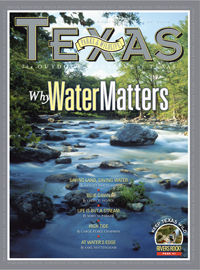
From the Pen of Carter P. Smith
The tools of a biologist were everywhere you looked in the little office in the headquarters of the Gus Engeling Wildlife Management Area. Proficiency certificates in prescribed burning and wildlife capture and immobilization hung on the walls. Old field boots lay in the corner. A weathered, sweat-ingrained hat was perched on the shelf. Field guides of every make and model sat in the bookcase, and a bird checklist for the wildlife management area sat on his desk, next to a pile of data sheets that needed tending.
In the middle of the desk was a day planner, open to the week of May 17. Judging from the entries scribbled in pencil, the week looked like a pretty typical one for a Texas Parks and Wildlife Department biologist in East Texas. The 18th and 19th were reserved for giving educational and outreach programs to schoolkids from nearby Elkhart. The 20th was reserved for a timber harvest of some kind, probably related to a habitat restoration project that was being undertaken with the National Wild Turkey Federation. And, on Friday, the 21st, there was an entry for an herbicide application, likely part of another habitat enhancement project the biologist was working on.
As I stood in that office on the morning of Saturday, May 22, and reflected on the entries I had just read, I caught myself as a tear ran down my cheek. You see, the only thing missing in that office was the wildlife biologist. And I couldn’t help but dwell on the fact that he would never be there again. Our colleague Wes Littrell was 32 years old when he died in a tragic tractor-related accident at the wildlife management area where he worked. The son of a proud North Texas farming family, he learned hard work and a love of the outdoors at an early age. As a high school student, he entered the Texas Parks and Wildlife Department’s annual statewide wildlife essay contest and took home first place in the state.
He told his father he wanted to go to college and study to become a wildlife biologist. His dad counseled him that jobs in that profession were hard to come by. Wes went anyway. He was an excellent student and earned a degree in forestry and wildlife from Stephen F. Austin State University. During that time, he worked as an intern for TPWD at Eisenhower State Park and later with the Wildlife Division. His strong work ethic, keen intellect and insatiable passion for enhancing native habitat made an indelible impression on all those he came in contact with.
Wes worked for TPWD for nearly 10 years before his accident took him from us. Those who knew him well said he was a biologist’s biologist, most content when managing a prescribed burn, reseeding an old field to native grasses or thinning overgrown post oak woodland to re-create the savanna-like conditions that once existed in the area. His passion was wildlife habitat — creating it, enhancing it, restoring it and managing it. He shared that passion with everyone he met, particularly landowners. He worked tirelessly to inspire them by demonstrating what could be done on tracts big and small to benefit wildlife on their own properties.
TPWD is better off because of the conservation ethic and contributions of Wes Littrell. We only wish he wouldn’t have left his family, his friends, his colleagues, this department and his beloved habitat so soon.
Thank you for caring about Texas’ wild things and wild places, as well as the people who steward them.

